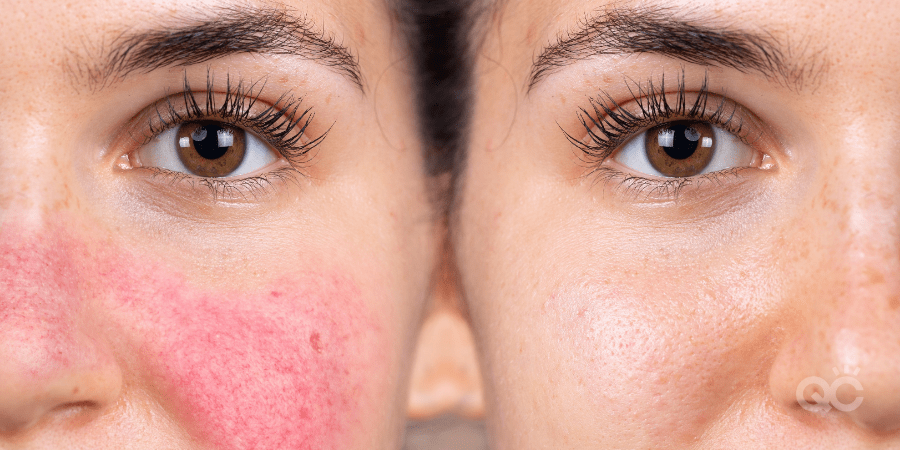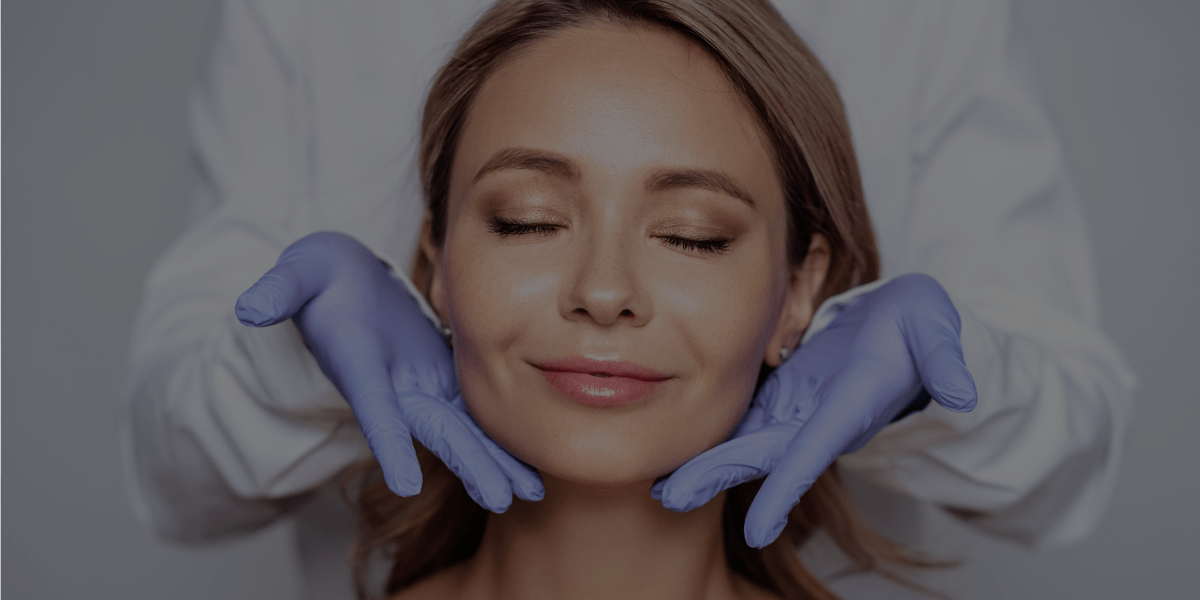Fun fact: I’ve been dealing with acne since I first hit puberty. The first few years were pretty horrible. As I entered high school, it at least tapered down enough that I no longer appeared perpetually shiny.
Growing up, I clung to the precious belief that one day, once I was older, my skin would finally start cooperating. But now that I’m nearing 30, I’ve realized that “perfect” skin doesn’t magically come to all of us with age. Many of us require additional, professional assistance.
This is where a dermatologist can come in!
Let me start by making the following very clear: if you experience skin issues, there’s nothing wrong with you. You’re still beautiful, just as you are! And hey, don’t feel like making any changes. Nothing wrong with that at all!
But if you are someone who wants a little extra help, this article is for you. Together, let’s take a look at 7 things you should consider when searching for your ideal dermatologist.

Finding the Right Dermatologist in 7 Easy Steps
1. Determine Your Skincare Needs
If you’re considering the aid of a licensed dermatologist, it’s likely because your skincare concerns exceed the qualifications of a certified skincare consultant. That being said, not all dermatologists can help you with the same things.
So, it’s important to narrow down what exactly it is you’d like help with. This will allow you to narrow down the type of dermatologists you should research.
For example, any of the following skin conditions would require medical assistance from a dermatologist:
- Severe acne (i.e. Nodulocystic acne, acne conglobata, acne fulminans, Gram negative folliculitis, etc.)
- Rosacea
- Psoriasis
- Actinic keratosis
- Aggressive skin allergies and/or sensitivity
- Eczema
- Melasma
- Contact dermatitis
- Vitiligo
- And much more
In the case of medical dermatological assistance, you may be prescribed some type of topical or oral treatment to help your condition. Creams, peels, and medicated ointments may be the recommended ministration.

On the other hand, any of the following would indicate the need for surgical assistance:
- Benign growths
- Impetigo
- Melanoma
- Squamous cell carcinoma
- Basal cell carcinoma
- And much more
Narrowing down the type of dermatologist you need will help you find your perfect match a lot faster. Your primary care physician should help by recommending dermatologists in your area.
2. Do TONS of Research
It probably goes without saying that your skin is a vital part of your body. The way it gets treated can have a direct affect on your overall well-being. With this in mind, you don’t want just anybody messing with your skin, right?
When searching for the perfect dermatologist, make sure you don’t skimp on your research! When you find a professional that catches your interest, go full detective and gather as much info as you possibly can.
Scour their business website and social media. Importantly, ensure to read their reviews! What past clients have to say about their professionalism and conduct will be critical in helping you decide if this dermatologist is worth your consideration.
Note: Don’t just read the reviews listed on their website. After all, no business is going to purposely market themselves in a negative way. As such, the reviews you see on their website may not always be telling the full picture. Search on more objective platforms for other reviews. Google, Facebook, and Yelp are great examples. Glassdoor offers an easy way to see what past employees have said about the business as well.
Here are some red flags to watch out for when reading reviews:
- Rude and unpleasant staff
- Hidden fees
- Poor bedside manner
- Unsatisfactory results
- Lack of professionalism
- Unrealistic promises
- Suspicious pricing structures
Some doctors and dermatologists can be known to discriminate based on gender, sexuality, race, etc. They may dismiss some individuals’ concerns as being ‘exaggerated’ or ‘hysterical’. It’s worth carefully paying close attention to reviews, in order to find a medical professional who’s willing to take ALL patients seriously!

3. Make Sure They Have Experience with ALL Skin Tones and Types
Not all dermatologists are thoroughly familiar with wide varieties of skin colors and/or types. If you have a specific skin type, or a medium to dark skin tone, this can have an impact on your dermatology needs.
As part of your research, take extra care to find a professional who has plenty of experience dealing with such issues as:
- Hyperpigmentation
- Excessive scarring
- Keloids
- Different skin types (i.e. dry skin, oily skin, combination skin, etc.)
- Different skin tones (i.e. light skin to darker skin tones, etc.)
If your dermatologist isn’t equipped to handle your unique needs, the results could potentially be disastrous. The last thing you want is for your issues to get worse, thanks to a misinformed skincare expert.
4. They Should Factor in Your Medical History
Most skin conditions are not isolated in nature. That is to say, there are often additional medical factors that need to be considered as well.
For instance, what is your diet like? Do you get enough sunlight, or drink enough water? Do you smoke, or drink excessively? Are you currently on any medications that could be contributing to the state of your skin? Do you have a history of disease or hormonal imbalance to consider?
If a dermatologist doesn’t seem to care about your medical history or general lifestyle, this is a BIG red flag! These are all major components in skincare. A proper expert will know this.

5. Check their Qualifications
A professional skincare consultant will most often have either a cosmetology license, or a reputable certification (such as from an online makeup school). Similarly, you want to make sure that you ONLY work with a dermatologist who has the proper credentials.
Most skincare experts will publicly list their qualifications right on their website. Of course, there are other ways you can double-check their credentials. The simplest option is to check into your country’s dermatology association or board. This will allow you to verify their certification(s), as well as the legitimacy of their expertise.
6. Schedule a Consultation
If it’s possible to safely meet with a dermatologist for an in-person consultation, this is always a smart move. However, if social distancing rules are still in effect, or you’re not yet comfortable making this kind of in-person appointment, check to see what other options they offer.
For instance, virtual consultations can be extremely effective, too. In the midst of a pandemic, they allow you the opportunity to speak directly with your dermatologist of choice – all from the comfort of your own home!
Consultations are important for a number of reasons. They give you the chance to tell the dermatologist about you and your skincare needs, as well as ask any questions you wish to have answered. The purpose of this consultation is for you to get a proper feel for one another.
Can this dermatologist successfully address and assist with your specific needs? Do you get a good vibe from them? Do you feel you can trust them to provide you with satisfactory service?
These are all questions that a consultation will help answer. If, after your meeting, your gut is telling you that this ISN’T the right dermatologist for you, don’t hesitate to listen to it! It’s better to take your time and find the right match, than to rush it and be disappointed with the outcome.

7. Take a Skincare Course
Another excellent way to know whether a potential dermatologist is the right fit for you is to gain some professional skincare knowledge yourself! Many accredited online makeup schools and beauty academies will offer extensive skincare training. This way, you can earn your own certification, and become well-versed in matters such as skin types, conditions, and various different treatment options.
No, you won’t have the exact same understanding of skincare as an expert dermatologist, but it’s definitely a start. Plus, having a foundation in skincare training will ABSOLUTELY help you better select the ideal expert, who can best tend to your personal needs!
